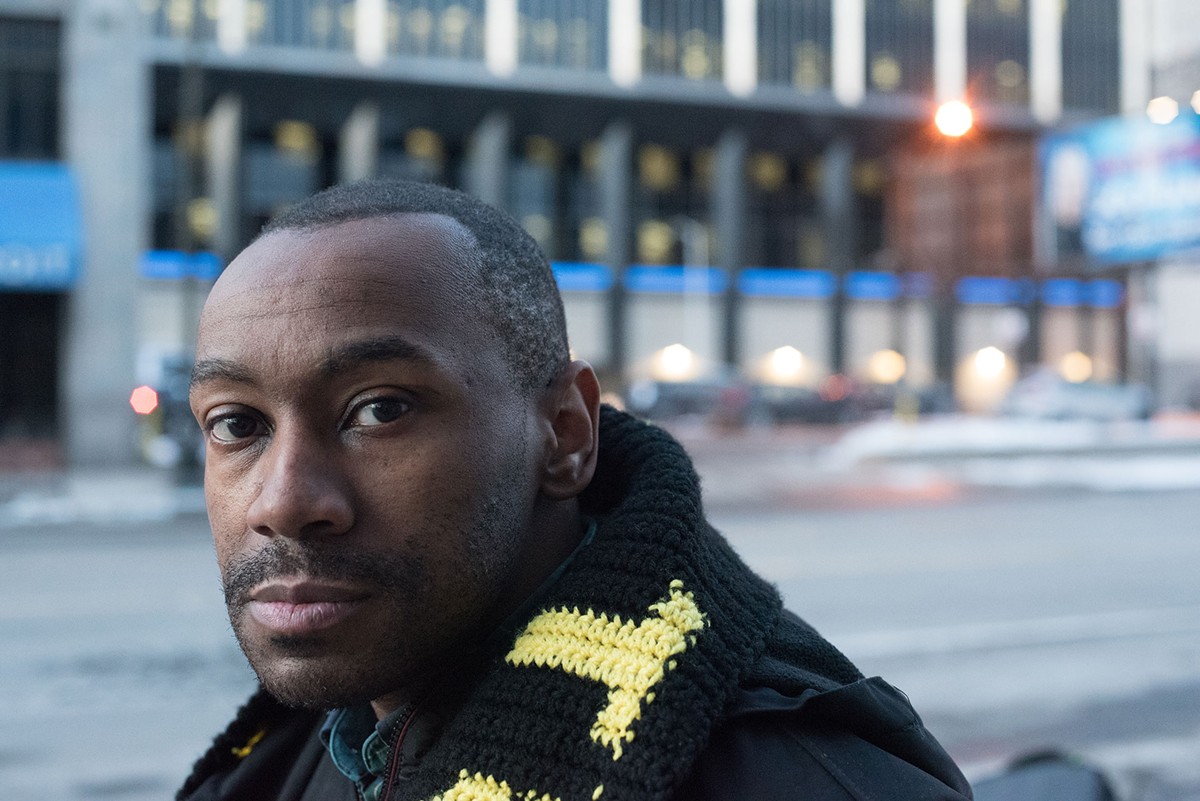It's a cold February evening and downtown Detroit's Anchor Bar is quiet. A handful of patrons converse a half a decibel above a murmur as top 40 hits from yesteryear play from the speakers mounted high on the wall. Detroit-born rapper and producer Leaf Erikson knows this area well; he spent 22 years not too far away at the Detroit Free Press as a high school sports reporter. But right now he's combing the menu of lagers with his index finger looking for one that's brewed in Michigan. Somewhere in between the Rolling Stones' "Satisfaction" and Bon Jovi's "Livin on a Prayer," a friendly dark-complected waitress walks to his table to take an order. Erikson asks about local beers (preferably Bell's) but the waitress isn't too sure. While trying not to show frustration Leaf settles for a New Belgium Fat Tire. "Ninety percent of the time, I drink local," he says. The interaction is symbolic of how Leaf lives his life; he prefers to support "local" every chance he gets.
Leaf has been a mainstay on Detroit's music scene for 20 years. He's been rapping since his preteens and got serious during his days attending Cass Tech high school. "We have a joke online that the best emcees went to Cass," he says with a laugh. He's grinded out 10 projects since 1997, each one being a combination of strong lyrics, relevant content, and diverse musical moods.
Late '90s Erikson partnered with Dakim to form the group Advanced Prep and released the album Underground Lair. In 2006 he released his first solo album, The Great Big Nothing, and joined Jah Connery in 2010 to form the group Smash Television, who went on to release the abstract Idiot Bocks. The '90s-inspired melodic Hidden Gems dropped in 2015 and on 2017's Monumentum, he teamed up with Dakim again. He was more than ready to retire, but fatherhood has kept him going. "My 16-year-old son, who's an aspiring artist, doesn't want to me to stop," he says. "He's my hero and my inspiration. I would've quit all of this several years ago if he didn't personally tell me that I had to keep doing it."
Although Erikson's music and talent have always been undeniable, he's stayed in the comfortable space he carved for himself locally due to a willingness not to compromise himself. "Honestly, I never wanted to be famous," he says. "I just wanted to make good music, network, and travel. I wanted to be able to make good money without all that celebrity nonsense. I've had several opportunities to take things to the next level. But I wasn't willing to sell myself to do so."
Erikson has stayed current with today's hip-hop scene, but he's still nostalogic about his journey starting out in the '90s. "Back then it was more of the essence," he says. "Since there wasn't social media, you had physical merchandise, and it felt like you were connecting with the arts more. We have rich history, but people don't know it. As much as I love Slum Village, people think that's the Detroit sound, but when I grew up it was AWOL, Awesome Dre, and Slum took it to another level, which is dope. I wanted to marriage the two, and I hope I did a good job because if it wasn't for them I wouldn't be here."
Erikson dropped the single "Foreclosure" off his album A Canvas of Hope last month. It's an aggressively political track that tackles Detroit's current gentrification and rebranding. "I had never done a project about Detroit," he says. "Any project I've ever done would be littered with references about Detroit, but I told my lady a few years ago that I wanted to do two to three projects dedicated Detroit." On the song he raps: "Sex, lies, and videotapes and handshakes/ all became a factor in the downtown landscape/ Not before property value fell to a low/ to recoup time to build they escrow/ They let the building collect dust, an eyesore/ Strategize, so they didn't have to pay more/ taxes on the backend while we became casualties/ in deals orchestrated by the Ilitch family."
"I feel like I have a responsibility," he says. " You see all these nice things in Midtown, downtown, and Corktown and in the neighborhoods; yeah, you knock a few houses down but what's the plan going forward?" he asks. "I know someone that bought a house and improved it but the city said it wasn't up to code, which it was, but it was because some millionaire whose name I'm not going to mention right now wanted that property. The playing level is not fair."
Erikson feels Canvas of Hope is one of his most complete and diverse projects. The 11-track album was entirely produced by Meftah and mixed by Eddie Logix. It features guest appearances by Jah Connery, Smoke, and Wu Tang songstress Blue Raspberry. "Blue Raspberry did the hook on 'H20'; it's an emotional track about Flint. She did the hook, and we were about to start crying."
Along with making new music, Leaf has also taken a leadership role in the hip-hop community. He keeps tabs on Detroit's newer hip-hop artists and is always willing give a tip when needed. "I love what they do," he says. "It feels good when they call and ask me questions or want to have a conversation. I'm about the scene and about the community. Baatin took me to the studio and out of town back in the day, so I try to pass that energy down."
Erikson performs at 11:15 p.m. on Saturday March 9 at the Hamtramck Music Fest at the Polish Sea League; 2601 Edwin St, Hamtramck; 313-872-8772; see hamtramckmusicfest.com for full schedule; tickets are $15 for wristbands for the full festival, March 7-9.
Get our top picks for the best events in Detroit every Thursday morning. Sign up for our events newsletter.


